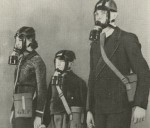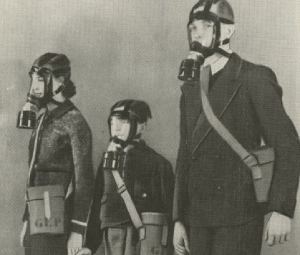
 Passive defense during the gas alert, AM Cannes, 1939.
Passive defense during the gas alert, AM Cannes, 1939.
In the 1930s, the social consequences of the economic crisis led the generalist and specialized press to summon the great figures of French psychiatry and psychopathology to determine the influence of the news in the outbreak of mental disorders. Significant since the birth of alienism, the question of whether historical upheavals can tip individuals into madness, allows different psychiatrists of the «Great Depression» to reconsider concepts inherited from the 19th century.
As much as the influence of events in the debut of madness of the “predisposed” and “constitutional degenerates” was hardly disputed, so much did the discussions on the role of the context, of the environment, at the beginning of the 20th century, lead to no consensus. The Great War certainly convinced some of the profession that such intense experience could be a factor in the onset of mental illness. But no unanimity prevailed when the controversy resurfaced in the light of the effects of the immense crisis following the Krach of 1929, and the electoral victory of the Popular Front.
In 1933, La vie médicale published a large survey on «The neuropsychic repercussion of current social anxiety» conducted among fifteen specialists. The opinions gathered then ranged from the most absolute scepticism to the more or less frank assertion of the existence of a relationship between the two. Among the contributors, Joseph Lévy-Valensi (1879-1943), associate professor and physician at the Ambroise-Paré hospital in Paris, provides a brief and balanced response, believing that the crisis certainly had repercussions on the psyche of individuals, while acknowledging the lack of statistics that can demonstrate the actual increase in mental disorders. Yet he took up the same subject during his lessons at the Sainte-Anne asylum, during which he discerned, among the reactionary psychoses, the so-called «psychoses of current events». According to Lévy-Valensi, current events can either create and reveal delusions, or nuance, illustrate them. Two series of patients exemplified his words: the first, «blurred» by the famous Stavisky affair, show that the news may have played a role in the outbreak of their delusions; on the contrary, the second series shows that the news has only influenced the delusional theme. In conclusion, keeping a cautious reserve, he again called for the establishment of genuine statistical studies capable to confirm a possible increase in mental disorders in correlation with the crisis, while considering that the patients observed had mainly borrowed from the news their «colours».
The issue bounced back with the strikes following the election of the Popular Front in the spring of 1936. Noting the admission of strikers in their services or elsewhere, Paul Delmas-Marsalet (1898-1977), in Bordeaux, distinguished himself by speaking the following year of «strike delirium»; and Maurice Leconte (1906-1987) in Paris of «strikers’psychoses». In 1939, he even supported a thesis entitled Conflits sociaux et psychoses (Social conflicts and psychoses), which had political connotations. Supported by statistics and graphs, his medical-social study aims to show “evidence of their close relationships.” Perceiving strikes as possible agents of psychological conflict, Leconte called on the public authorities to pay more attention to their psychiatric consequences and to take preventive action against these “ferments of anxiety and hatred, responsible for disorders […] that may lead to alienation”. By arguing that political and social movements were likely to give rise, as would an armed conflict, to real psychic epidemics, the views of Delmas-Marsalet and Leconte appear, in fine, as true avatars of the Morbus democraticus or “democratic plague”, born of the egalitarian passions of the previous century.
In all likelihood, these «rhetorical delusions» mixing psychiatric observations, prophylaxis, social stigmatizations and conservative political aims, will hardly last after the war. On the one hand, the notion of “reactive” psychosis, developed as a result of traumatic shock, eventually prevails. On the other hand, even if the influence of social events is no longer contested, the sharp decline in admissions during World War II and the rather small number of suicides and mental illnesses observed after leaving the Nazi concentration camps helped to corroborate the thesis that the rate of morbidity would decrease in times of war or disaster and attest to the marginal character of this mode of entry into madness.
Read more in the dictionary : Female delirium - Political excitement
Read the paper in French : Psychose d'actualité
References :
Laure Murat, L’Homme qui se prenait pour Napoléon. Pour une histoire politique de la folie, Paris, Gallimard, 2011.
Hervé Guillemain, Stéphane Tison, « La clinique des délires de guerre (1870-1940) », in L. Vissière, M. Trévisi (dir.), Le feu et la folie. L’irrationnel et la guerre (fin du Moyen Âge – 1920), Rennes, Presses Universitaires de Rennes, 2016, p. 189-201.
To quote this paper : Florent Serina, «Psychosis of current events », in Hervé Guillemain (dir.), DicoPolHiS, Le Mans Université, 2021.